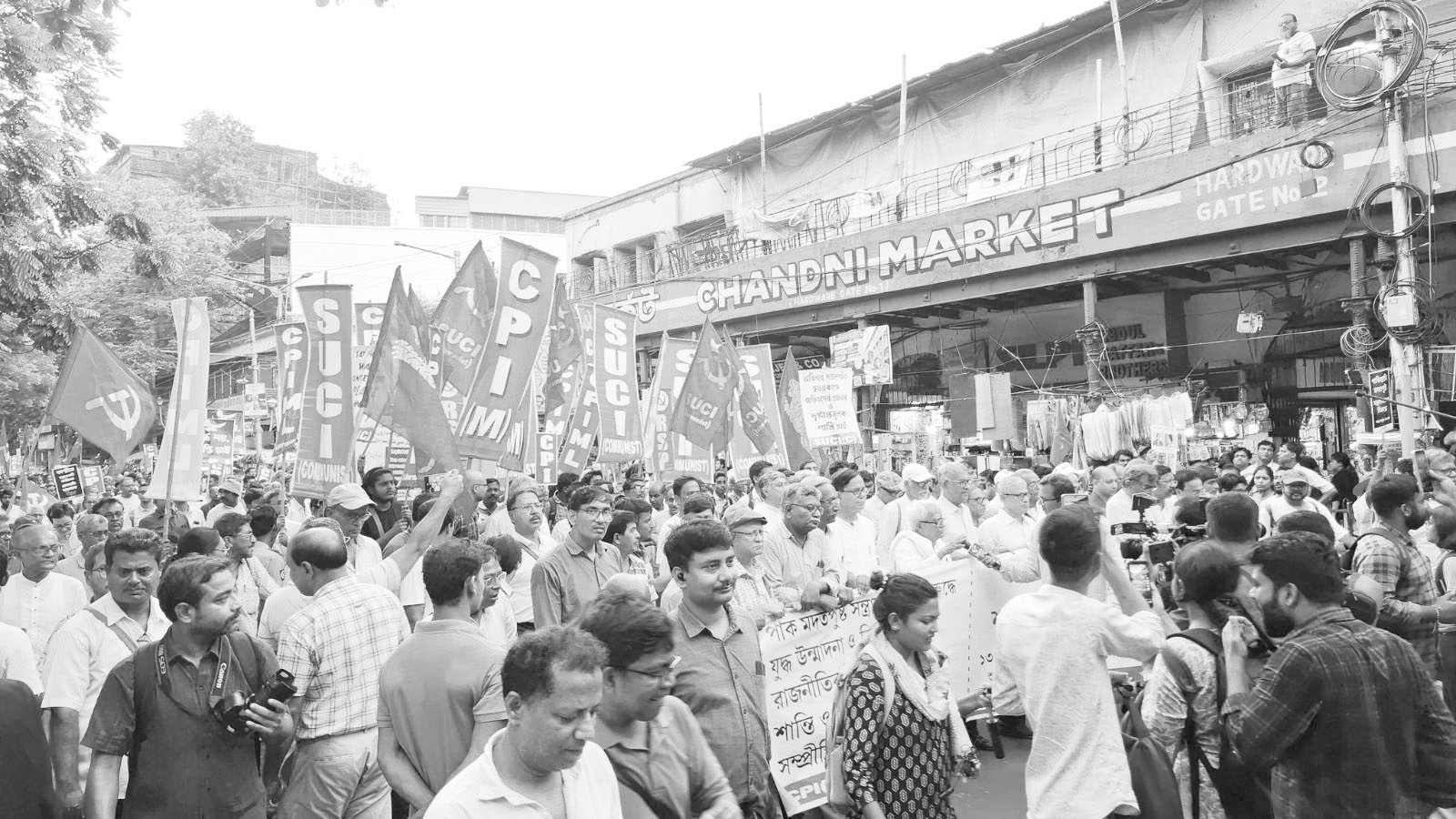
Samprikta Bose
FOLLOWING the horrific terrorist killings in Pahalgam and India's subsequent military response, far-right forces within the country are attempting to expand their political influence. Exploiting the national crisis for their narrow political ends, they are inciting warmongering and fostering a climate of communal division. Disturbingly, those consistently advocating for peace and harmony are being silenced and subjected to hardship. Conversely, there seems to be a lack of governmental action against those spreading misinformation, deliberately inciting war fever, and insidiously propagating communal hatred and division. This inconsistent application of accountability is a major cause for concern and contention.
It was against this backdrop of inaction towards instigators of conflict and division, coupled with the harassment of peace advocates, that the leadership of various Left-leaning political organisations convened a significant demonstration in Kolkata on May 6. This collective action served as a powerful expression of their unified stance against the destructive forces of war and terrorism, and as a resounding affirmation of their commitment to the ideals of peace, mutual understanding, and communal harmony. The assembled leadership directed their pointed questions and demands for explanation towards both the central government, holding national authority, and the state government, responsible for governance within their specific region.
In their collective address to the public and the authorities, the Left leaders articulated a concerning perspective. They asserted that those within the nation's borders who actively engage in the peddling of communal hatred are, in effect, playing the role of collaborators and facilitators for external adversaries and terrorist elements. This is a grave point, suggesting a dangerous nexus between internal divisive forces and external threats to national security. Despite the severity of these alleged actions, the prime minister, the highest executive authority in the country, has remained conspicuously silent, failing to publicly condemn or address the activities of these hate-mongers. Furthermore, the state law enforcement agencies, the police, have also been criticised for their apparent inaction in taking appropriate measures against these individuals and groups accused of spreading discord and animosity.
The demonstration in Kolkata was a powerful display of unity among a broad spectrum of Left political parties – the Communist Party of India (Marxist), Communist Party of India, All India Forward Bloc, Revolutionary Socialist Party, Communist Party of India (Marxist-Leninist) Liberation, Socialist Unity Centre of India (Communist), Revolutionary Communist Party of India, Marxist Forward Bloc, Workers Party of India, and the Bolshevik Party of India – came together to jointly organise and participate in this significant march. Their collective presence underscored the widespread concern within Left political circles regarding the issues of war, terrorism, and the erosion of peace and communal harmony. The sheer scale of the rally indicated the depth of feeling and the commitment of these parties to advocating for a more peaceful and inclusive society.
The march began around 5:30 pm near Lenin's statue in Kolkata's Dharmatala, with participants displaying posters and banners advocating for humanity and an end to violence. Slogans reinforced these ideas as the procession moved along Lenin Sarani, a historically significant route, and concluded near Sealdah Railway Station. The large, vocal march resonated with onlookers, evoking Kolkata's history of resistance and progressive thought.
Leading this significant demonstration were prominent figures from the Left political landscape: Biman Basu, chairman of the Left Front, Md Salim, state secretary of the CPI(M), Ram Chandra Dom and Sreedip Bhattacharya, CPI(M)'s Polit Bureau members, Surya Mishra, veteran CPI(M) leader were present. The CPI was represented by its state secretary, Swapan Banerjee. Leaders from other participating parties included Kartik Pal and Jayatu Deshmukh from CPI(ML) Liberation, Chandidas Bhattacharya representing SUCI(C), Ratan Bhattacharya from the Forward Bloc, and Debashis Mukherjee of the RSP. The presence and active participation of such a broad array of senior leaders from all ten Left parties underscored the unified nature and the importance they collectively attributed to this demonstration.
TERRORISM, TROLLING AND TRUTH
Following the culmination of the march, a brief but significant public meeting was held. Md Salim reaffirmed the Left's long-standing opposition to violence and division, referencing their immediate protest in Kolkata following the Pahalgam terrorist attack. He stressed that national external threats necessitate national unity, stating "unity is our strength," and cautioned that internal disunity would be exploited by enemies. Salim pointed out that even the foreign secretary later confirmed the terrorists aimed to incite communal discord.
Salim expressed deep concern that the RSS is deliberately using media to divert attention and sow discord through war hysteria. He criticised the prime minister's silence regarding communalism, fake news (including inaction against outlets spreading it), and the harassment of independent media like "The Wire."
Presiding over the meeting, Biman Basu called for workers to unite and warned against those trying to divide them along religious lines.
Swapan Banerjee stated that those who incite war are "traitors" as war leads to higher taxes, increased costs of living, and manipulation of public anxiety to distract from governmental failures and exploit the populace. He argued that distraction and exploitation are the main goals of those promoting conflict.
Chandidas Bhattacharya asserted that "war does not end terrorism," arguing that imperialist powers, not ordinary people, benefit from conflict. He affirmed Leftist parties' opposition to war and condemned the dangerous association of entire religious communities with terrorism, leading to unjust persecution.
Jayatu Deshmukh likened media coverage of war to IPL cricket broadcasts, criticising its trivialisation and the harassment of those opposing it. He emphasized the Left parties' street protests against this dangerous trend.
Debashis Mukherjee noted that following the Pahalgam attack, while all political parties supported decisive action against terrorism in an all-party meeting, the prime minister's absence raised questions about his commitment to public safety.


